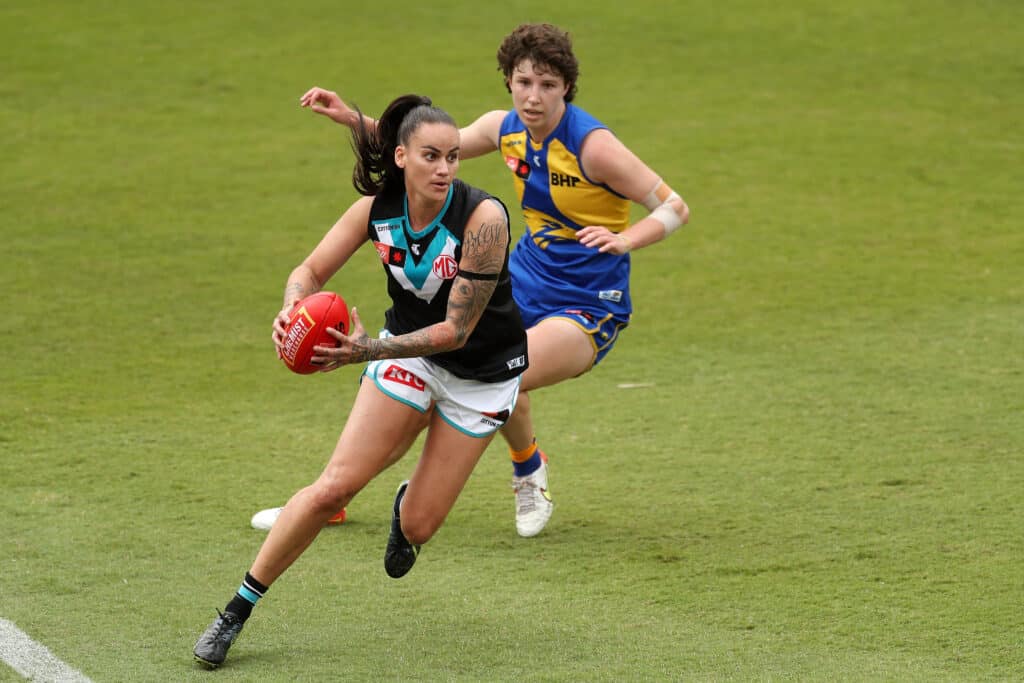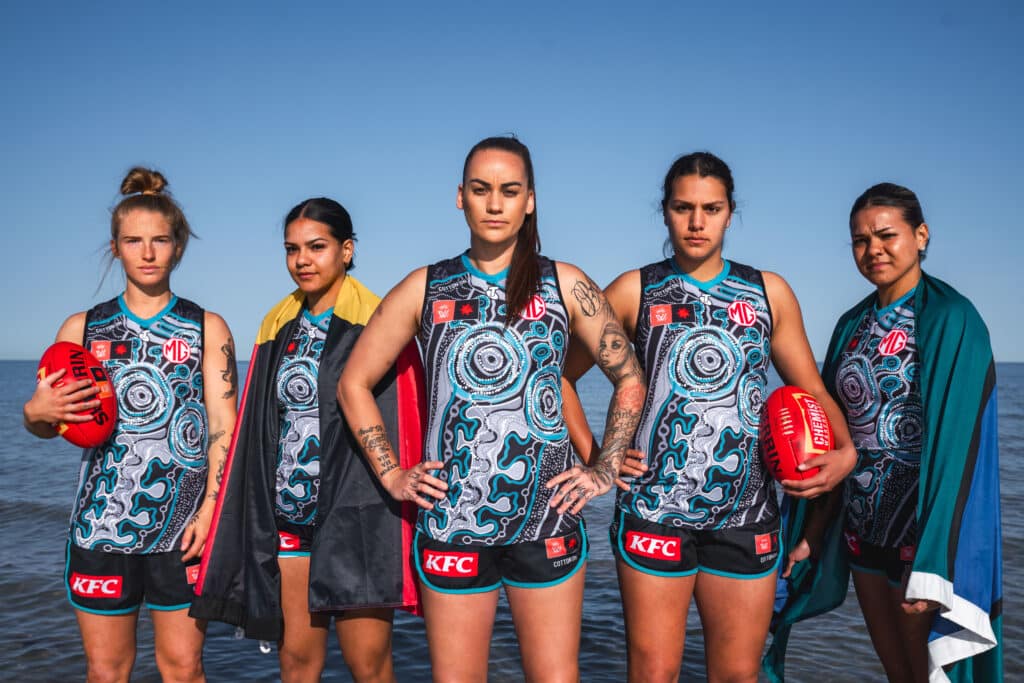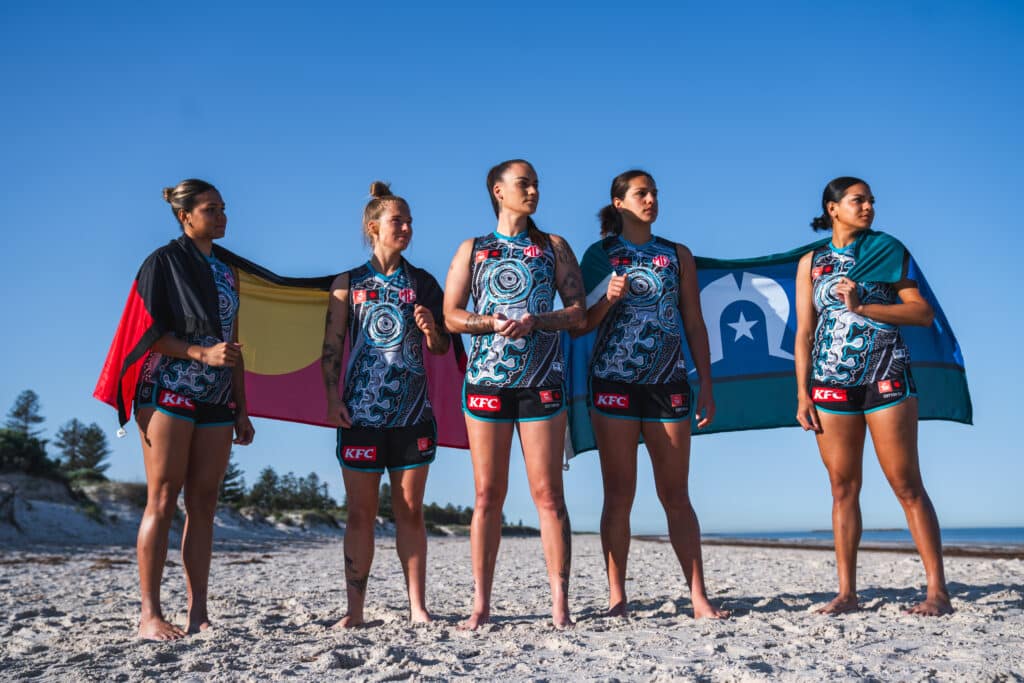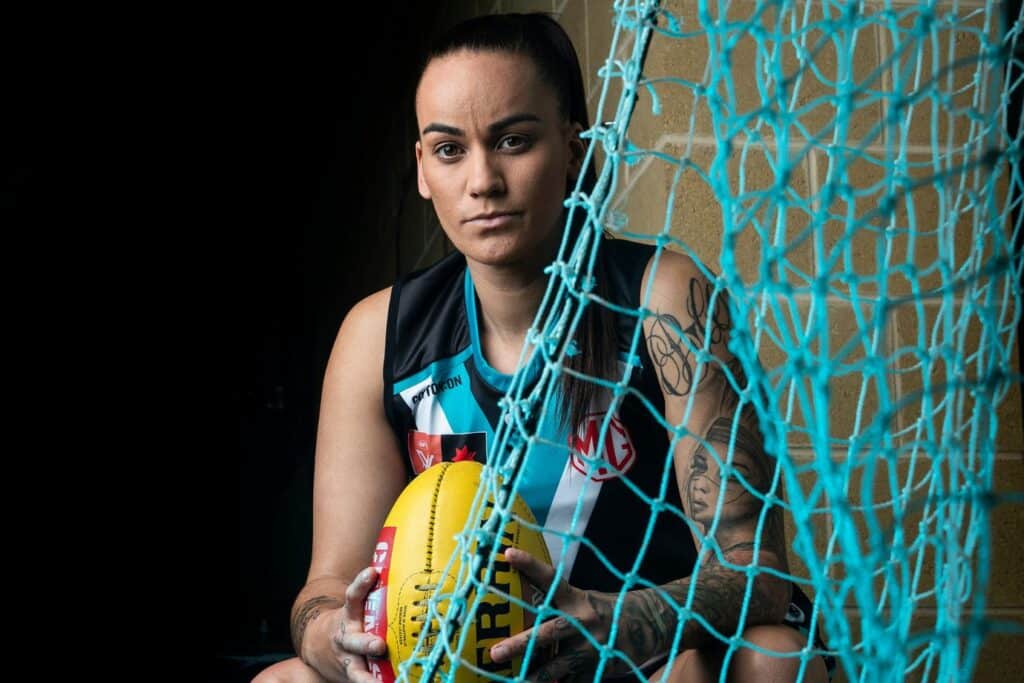Before Gemma Houghton was born, her grandmother, Clara Coffin, used to collect hundreds of shells from the beaches of Marapikurrinya land in Port Hedland, WA.
Now, this weekend, her team at Port Adelaide FC will don the guernsey for the AFLW’s Indigenous Round, co-designed by Houghton and Aṉangu Pitjantjatjara artist Tjunkaya Ken, featuring those shells her grandmother collected.
“What that represents for my family is so significant and special,” Houghton told Women’s Agenda.
“It’s perfect for my grandmother, Tjunkaya’s grandmother and the sistership around the club – and how it all brings us together.”
Houghton is a Yindjibarndi woman and Port Adelaide’s star forward, moving to the club from Fremantle last year. Footy was never on the cards for her sporting career, but she was surrounded by the game growing up as a kid.
“I loved anything outdoors,” she said.
“My brother grew up playing footy and we played in the neighbourhood park together, versus the neighbourhood kids. We were always around football and watched it on the TV.”
From the age of 10, Houghton began playing basketball and was building a promising career in the sport. But a DM her brother Joel received one day from Fremantle’s key forward Ebony Antonio turned everything around.
“My brother went to a high school in Perth where Ebony Antonio went to… and she just inboxed him one day and said: ‘Would Gemma ever be interested in playing footy?’
“And that’s kind of where the conversation sparked for AFLW.”

Although she “didn’t have the best footy skills” at the time, Fremantle’s coach Michelle Cowan recognised her athleticism.
“They took a chance on me. And here I am, eight seasons later,” Houghton said.
Houghton debuted in the AFLW’s inaugural season in 2017, but a stress fracture in 2018 limited her to playing just two games.
“I gained a bit of weight and sort of just lost a lot of ability with that injury,” Houghton said.
It was this season that was the most challenging part of Houghton’s career, especially when Fremantle did not offer her a contract for a third year at the club.
“I remember driving out of headquarters thinking: ‘What am I gonna do?’” Houghton said.
“So I went away and worked my absolute butt off for two months.”
Her epic comeback earned her a spot back in the Fremantle side. By 2020, Fremantle were at their best, winning seven games in a row before COVID-19 cut the season short.
Houghton achieved so much as Fremantle’s key forward. She was picked in the All-Australian side in 2019 and 2021 and was the club’s leading goalkicker in 2019 and 2020.
But Houghton said one of the highlights of her career, despite its challenges, was moving to Port Adelaide.

“(It was) a complete lifestyle change of moving away from my family and friends… learning to be in a professional environment, away from what you’re so familiar with,” she said.
Houghton was also joining the club where one of her sporting role models Erin Phillips played.
“(I am ) playing alongside Erin Phillips, who is someone I’ve always looked up to, even during my basketball career,” she said.
“It’s so amazing and special to be able to learn from her and just watch the things behind closed doors that you don’t often see in a football match on TV.”
Last year, Houghton was approached by Port Adelaide, asking if she would design the club’s Indigenous guernsey for the AFLW’s Indigenous Round, which continues this weekend.
As a Yindjibarndi woman and artist herself, Houghton agreed and was looking for another female artist in Adelaide to collaborate with.
That’s when she came across Tjunkaya Ken, an Aṉangu Pitjantjatjara artist who was born and raised in Adelaide. The pair got talking and got to know each others’ stories, and realised the connections they had together that would bring the artwork on the guernsey to life.
One element of the guernsey is an Indigenous story, which was passed on to Tjunkaya Ken by her grandmother.
“The story line is two sisters – the older sister and the younger sister – and it’s about the older sister teaching the younger sister about life and the journey of coming together,” Houghton explained.
The other element incorporates the memory of Houghton’s grandmother, Clara Coffin.
“My grandmother collected hundreds of shells… and we were able to get photos of a couple of those shells that were really special to her, and they’re on the guernsey,” she said.
Being able to represent both artists’ grandmothers on the guernsey was really special for Houghton and Ken, as it also represented the importance of “sistership” in their cultures, the club and beyond.
“I think it’s perfect for my grandmother, Kayla’s grandmother and the sistership around the club – and how it all brings us together,” she said.
“We have five Indigenous players at the club in the women’s squad. I think it’s really important for myself and for the other players to be connected.”

Despite the “difficult time” Australia faces with the failure of the Indigenous Voice to Parliament referendum last weekend, Houghton said the AFLW’s Indigenous Round is extremely important.
“I think it helps in terms of growing and unifying the community together,” she said.
“Football is a game that is inclusive for all, and is a sport that’s definitely familiar with Indigenous people. We played it thousands of years ago when it was Marn Grook.
“I remember even before I was playing in the AFLW, all the Indigenous role models in the men’s competition that were just always on TV… the inspiration that it has and the impact it can have on young lives, in particular when they see a role model that is from the community… it gives them hope and belief that they can too be in a position like that if they want to.”


